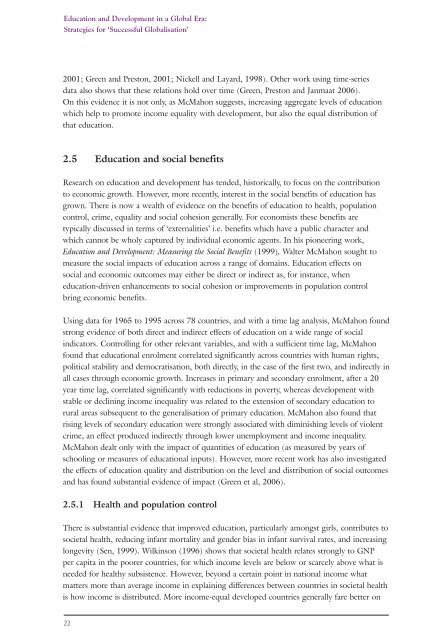education-dev-global-era-69
education-dev-global-era-69
education-dev-global-era-69
You also want an ePaper? Increase the reach of your titles
YUMPU automatically turns print PDFs into web optimized ePapers that Google loves.
Education and Development in a Global Era:Strategies for ‘Successful Globalisation’2001; Green and Preston, 2001; Nickell and Layard, 1998). Other work using time-seriesdata also shows that these relations hold over time (Green, Preston and Janmaat 2006).On this evidence it is not only, as McMahon suggests, increasing aggregate levels of <strong>education</strong>which help to promote income equality with <strong>dev</strong>elopment, but also the equal distribution ofthat <strong>education</strong>.2.5 Education and social benefitsResearch on <strong>education</strong> and <strong>dev</strong>elopment has tended, historically, to focus on the contributionto economic growth. However, more recently, interest in the social benefits of <strong>education</strong> hasgrown. There is now a wealth of evidence on the benefits of <strong>education</strong> to health, populationcontrol, crime, equality and social cohesion gen<strong>era</strong>lly. For economists these benefits aretypically discussed in terms of ‘externalities’ i.e. benefits which have a public character andwhich cannot be wholy captured by individual economic agents. In his pioneering work,Education and Development: Measuring the Social Benefits (1999), Walter McMahon sought tomeasure the social impacts of <strong>education</strong> across a range of domains. Education effects onsocial and economic outcomes may either be direct or indirect as, for instance, when<strong>education</strong>-driven enhancements to social cohesion or improvements in population controlbring economic benefits.Using data for 1965 to 1995 across 78 countries, and with a time lag analysis, McMahon foundstrong evidence of both direct and indirect effects of <strong>education</strong> on a wide range of socialindicators. Controlling for other relevant variables, and with a sufficient time lag, McMahonfound that <strong>education</strong>al enrolment correlated significantly across countries with human rights,political stability and democratisation, both directly, in the case of the first two, and indirectly inall cases through economic growth. Increases in primary and secondary enrolment, after a 20year time lag, correlated significantly with reductions in poverty, whereas <strong>dev</strong>elopment withstable or declining income inequality was related to the extension of secondary <strong>education</strong> torural areas subsequent to the gen<strong>era</strong>lisation of primary <strong>education</strong>. McMahon also found thatrising levels of secondary <strong>education</strong> were strongly associated with diminishing levels of violentcrime, an effect produced indirectly through lower unemployment and income inequality.McMahon dealt only with the impact of quantities of <strong>education</strong> (as measured by years ofschooling or measures of <strong>education</strong>al inputs). However, more recent work has also investigatedthe effects of <strong>education</strong> quality and distribution on the level and distribution of social outcomesand has found substantial evidence of impact (Green et al, 2006).2.5.1 Health and population controlThere is substantial evidence that improved <strong>education</strong>, particularly amongst girls, contributes tosocietal health, reducing infant mortality and gender bias in infant survival rates, and increasinglongevity (Sen, 1999). Wilkinson (1996) shows that societal health relates strongly to GNPper capita in the poorer countries, for which income levels are below or scarcely above what isneeded for healthy subsistence. However, beyond a certain point in national income whatmatters more than av<strong>era</strong>ge income in explaining differences between countries in societal healthis how income is distributed. More income-equal <strong>dev</strong>eloped countries gen<strong>era</strong>lly fare better on22





